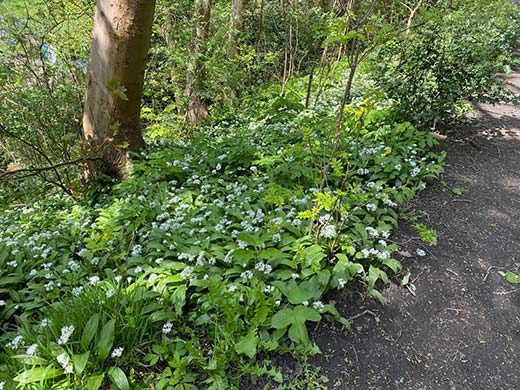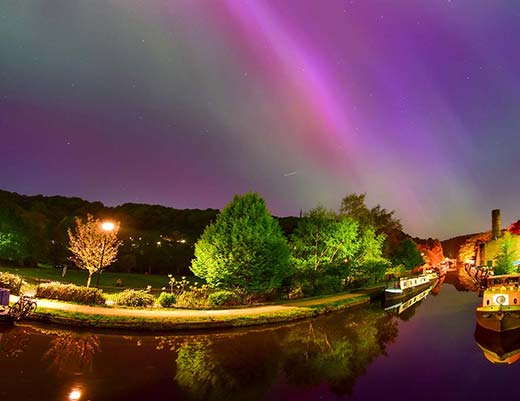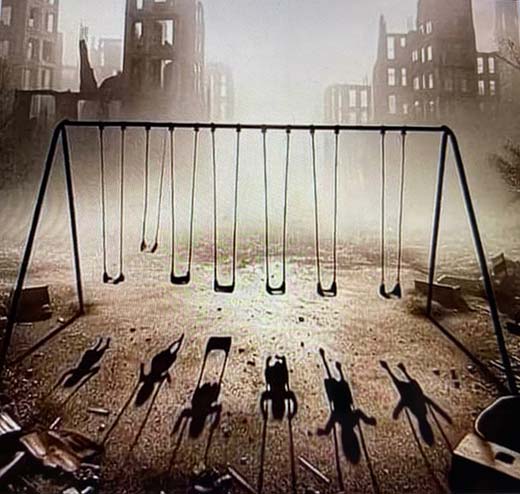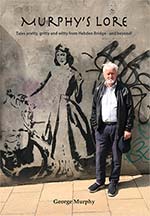
Fourth series, episode 9
All 141 episodes are available here on the HebWeb.
In the latest episode, there's a salacious misspelt letter, Mayday and Beltane, a once in a lifetime experience missed, folktales knowing no boundaries, reviews are reviewed and a new tale is told of Hebden Bridge
Dear Miss Lonely Hearts,
I crave your advice. I’ve received a message from a scantily clad female in response to one of my innocent social media posts (about a muster of storytellers in a pub, for goodness sake!).
"How are you doing today? I Came Across your profie and is very Lovity and Avesome. 1 will like to know more about a man Lice you would you mind sending a direct message or friend request thank you."
Even though her written English suggests she isn’t a native speaker, she signs her name as Janet. Might that be a pseudonym? Should I respond to her request? Your advice is keenly awaited,
George, aged 73, Hebden Bridge
May Day
My memories of May Day celebrations in Ellesmere Port in the 50s are me and my mate Raymond getting our faces blackened with soot, then knocking on doors all down our street, while my sisters and their mates (all dressed in white) sang their way along the road in a tiny procession while dragging the Queen of the May (my youngest sister, I think) along in an old pram. At intervals, the girls danced round a Maypole which was converted from a clothes prop, with ribbons wrapped round it. Our job was to knock on doors and ask for loose change along the way. We swore the money would be forwarded to the children’s ward at the local cottage hospital.
Before we set off, Me Mom said to be sure to knock on Granddad Murphy’s door, at the corner of the next street. "He has plenty of money."
Some adults came out to watch the procession, before handing over their coppers; making sure Raymond and I weren’t pulling a fast one. Some complained that they’d already made a contribution to a rival procession which had set off before us. But most rummaged a few coppers from their pockets and slid it into our tins. When we eventually paused outside the gate to Gran and Grandad Murphy’s redbrick semi, I whispered Me Dad’s warning to Raymond, "Don’t ask Grandad about the First World War!"
I saw the net curtains twitch as I strode down the path, before confidently slamming the heavy door knocker down three times. I had my smile ready as the door slowly opened, but was shocked when Grandad barged out and chased me and Raymond down the path, wielding a poker, and shouting, "Yous can get, you black beggars!"
Once we’d slammed the gate after us, we turned and saw my Grandad go back indoors, slamming the door after him.
Raymond said, "He didn’t recognise you! Just go and tell him it was you!" But he didn’t volunteer to come with me, so I decided against it.
Despite Grandad chasing us away, we collected a decent stash of coins and the next weekend we had a party in our back garden.
Down to the woods
Redacre Woods have masses of bluebells just now. Just as I like to see them, especially when the sun beats on them before the leaf canopy comes over. In moist areas, the wild garlic is also prolific. PW says – but cameras can’t capture smells.

More lore
In Ireland the festival of Beltane has been revived in recent years, marking the transition from spring to summer. On your behalf dear readers, I roamed through a dozen websites, to save you from seeing latter day pagans indulging in naked or semi-naked cavorting to rhapsodic drumbeats at New Age festivals. I like a good bonfire, and some of the events In Ireland and Scotland climax by lighting giant wicker men. In England, the church took over the sacred sites of Beltane ceremonies and gradually sifted out fleshy celebrations of seasonal fecundity, replacing them with Morris and Maypole dancing.
Another reminder of ancient rituals is well dressing, which we encountered in Spaw Sunday celebrations at Midgley in the 70s and Soyland Town in the 80s. Although the festivals in the Peak District and the Malvern Hills are more widespread, and attract larger crowds, the Cragg Vale Spaw Sunday has proved popular in the last few years. Again, the worship of reliable water sources is based on Pagan traditions. The wells are usually dressed with spring flowers rather than ribbons.
The Community Association in Cragg Vale records that many local place names evidence the importance of the local spa over the years. Brave young men are still encouraged to knock back a tipple of spa water in one go. Liquorice or bicarbonate of soda (to counter the bad eggs taste) is sometimes added to the water and older locals have attested to its health giving properties. Back in 1906, 500 people took the waters and survived well enough to follow the local brass band on a trek up to the White House hostelry at Blackstone Edge. Orators from the Independent Labour Party addressed the gatherings. Mayday became a celebration of the workers as well as cheery welcome to new life.
Once in a lifetime
I bumped into Andrew Smith, photographer extraordinaire, last Friday at a local hostelry, and we had a drink or two. I got in at 10.30, and watched the recording of Have I Got News For You, little realising that the real news was happening outside. As Mr Smith sauntered home, he and most people in Europe gazed up at a spectacular display of northern lights, the like of which we might not see again in our lifetimes.

Photo: Andrew Smith
The garden awakes
Herb bennet, wood geum or wood avens – are a sign of the ancient woodlands that used to flourish undisturbed in these valleys before the industrial age, and it’s a bugger to pull out with its strong stalk and tenacious roots – also it spreads. Floods deposit the remnants of other people’s weeds and flowers in our garden, but the wood avens might always have been there. We get Spanish Bluebells too, which are beautiful but famously prolific. I tell myself that weeding is to gardening what editing is to writing.
By the way, has anyone else been annoyed by wasps this year? They’ve been visiting our house at regular intervals, seemingly keen to inspect our double glazing. I mean, isn’t the wasp pest season supposed to be in late summer! What’s happening to the world?
Sharing stories
Reading the 19th century collection of Fairy and Folk Tales of Ireland, compiled by WB Yeats (Chancellor Press, 2000), I came upon a section on Tir-Na-N-Og, and remembered I had written my own tale of Usheen who was lured by a white stag into that magical world of the Ever Young.
Thirty five years ago, I attended my first course on storytelling. It was run by Betty Rosen, who told an Irish tale which is similar to The Land Where One Need Never Die (collected by Italo Calvino in Italian folk stories (Penguin, 1987). In both versions the hero begs to visit his family and the village where each spent their early years. Each youth is warned not to get down from the magic stallion on which they make their journeys. In that magic land, an hour is equal to decades amongst mortal people. I subsequently told (after becoming an English AT) the Italian version of the tale in countless classrooms. Children, who were liberated from making up their own plots, retold and rewrote the tale with a care and enthusiasm I had never seen before.
Remembering all this, caused me to dig out Rosen’s Shapers and Polishers (Mary Glasgow Publications, 1991), which included two stories I had written in Betty’s one day course. One was about my first memory. The other was the tale of Usheen, where we were asked to provide a twist to the tale. So here’s my tale from that training day, with some of Betty’s comments.
Tir-An-Noag
Now Liam and his brothers lived in a place beyond this place. And you won’t know about that place unless you have woken from a dream and thought, "I’ve woken from a place where I would always want to be." And you’ve cursed yourself for waking, because you can only remember the way of things and what happened, but not the most important thing: the way it felt to exist there. For that place is known as Tir-an-Noag and we all know of that place if we are human and can dream.
Betty: Here the storyteller steps out of his story to talk to those receiving it. This is one of the many ways in which writers borrow from the oral tradition. Notice too, that the narrator makes his or her presence felt, stepping out of the narrative to buttonhole us. It has its risks. An error of judgement and we’ll be saying, ‘Get on with it! This is supposed to be a story not a sermon.’ Perhaps this is a good place to see how my storyteller manages to walk this razor edge.
And in that place called Tir-An-Noag, everyone is young. And half of those books on your shelves would not need writing in Tir-An-Noag, for like me you read poetry, and what is poetry but one half My True Love and one half Why Must My True Love Die? But in Tir-An-Noag true love lasts forever.
And in Tir-An-Noag there are no schools, for people know things in their hearts.
Now Liam and his brothers, Declan and Sean lived in Tir-An-Noag, in a lush green valley where everything was provided for them and they did not need to hunt or kill, for they only needed to spill the fruits from the trees into their hands and they were fed.
Betty: In this retelling, the brothers’ idyllic life is interrupted by the appearance of a stranger riding on a black stallion whose mission is to return to another place to meet with his brothers. Liam determines to join the stranger – whose name is Usheen – in spite of his warnings.
"You must not come with me, for my land is not like your land and the people in my land have a terrible knowledge; nor can they do anything without wondering why they do it or what lives are for and all the people in my land would like to live here."
Betty: but Liam has experienced a terrible thirst for knowledge and incidentally, remembering how he once hunted with his brothers, a ‘desire to hunt wild beasts and to kill living things.’ Not long after he arrives upon the stranger’s earth he hears a drumming sound and it wasn’t like the music Liam had heard in Tir-An-Noag. This music did not dance and meander so that you had to clap and pick up your heels and grab each other’s hands and wheel your partners round to its beat. This drumming was staccato and insistent and repetitive …
… he saw men all wearing the same clothes: dark helmets with holes cut for them to see. And Liam ran towards the men, thinking they must be hunters, Usheen leapt from his horse and ran to stop him.
The men with balaclavas raised their guns and pointed them past Liam towards Usheen. For the men recognised him. Wasn’t this the man their enemies spoke of? Wasn’t this Usheen whose spirit would live forever? Didn’t this man live on in the legends of their enemies?
And they fired.
Betty: We are not told the fate of the fictional Liam. Whatever it might have been is little compared to the fate of an oppressed Irish nation. That without a doubt played no part of my rendering of the Usheen story which triggered this one.
Ted Hughes on reviewers
Now, the thing is, storytellers aren’t used to being reviewed. Critics from the national press very rarely comment on their performances. Maybe that’s a blessing.
Here’s Ted Hughes reviewing reviewers, in a 1967 letter to the confessional poet Anne Sexton, (Letters of Ted Hughes (Faber and Faber, 2007).
"Don’t you worry about reviews. I’ve just been getting a load of them too. Both kinds are bad, but the favourable are worst I think. They tend to confirm one in one’s own conceit – unless they praise ones that you yourself don’t like. Also, they make you self-conscious about your virtues – just as when you praise a child for some natural charm. Also they create an underground opposition: applause is the beginning of abuse. Also, they deprive you of your own anarchic liberties, by electing you into the government.
Also they separate you from your devil, which hates being observed, and only works happily incognito. Also, they deprive you of your detachment from the scene into which you are injecting your work, by making you a visible part of the scene. Also, they satisfy ambition, which only works from a radical discontent and public neglect.
Also, they banish your spirit helpers, as when the eskimo hunter enters upon a gift shop and buys a car. Also, they falsify your life, by forcing an identification of you and your poems: your poems earn the praise but you read and accept it. Etc Etc. Whereas bad reviews are like a humiliation: you feel you must conscript every reserve including God and the Devil, that will withstand everything. They send you into the wilderness."
Mind the baby toads!
Please be careful if you walk through Hardcastle Crags in the next few weeks, to avoid trampling on tiny toads. It’s a wonderful sight to see them march in their hundreds along the top road on one special evening. Magical, in fact. And magic belongs in fairy tales:
Coming out day: a fairy tale of Hebden Bridge
And finally …
Banksy responds to the horrors in Gaza.

Murphy's Lore, the book, is available to order here
If you would like to send a message about this piece or suggest ideas, email George Murphy
More Murphy's Lore
See the Murphy's Lore home page for all 141 episodes.


